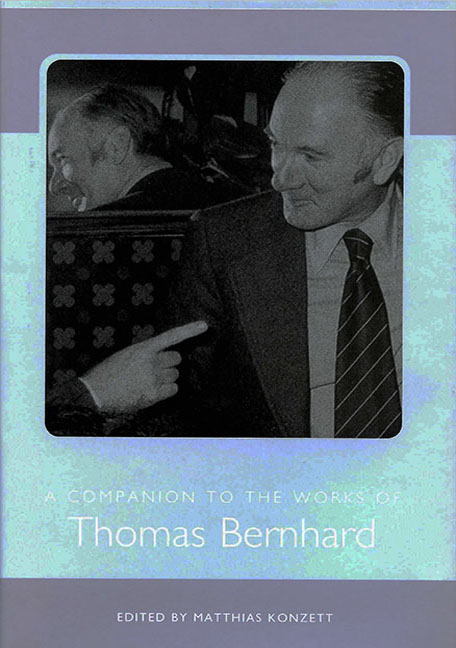Book contents
- Frontmatter
- Contents
- Acknowledgments
- Abbreviations
- Bernhard in the Public
- Introduction National Iconoclasm: Thomas Bernhard and the Austrian Avant-garde
- Perverted Attitudes of Mourning in the Wake of Thomas Bernhard's Death
- The Established Outsider: Thomas Bernhard
- A Testament Betrayed: Bernhard and His Legacy
- Bernhard's Poetics
- Bernhard and Drama
- Bernhard's Social Worlds
- Works Cited
- Notes on the Contributors
- Index
Perverted Attitudes of Mourning in the Wake of Thomas Bernhard's Death
from Bernhard in the Public
Published online by Cambridge University Press: 28 April 2017
- Frontmatter
- Contents
- Acknowledgments
- Abbreviations
- Bernhard in the Public
- Introduction National Iconoclasm: Thomas Bernhard and the Austrian Avant-garde
- Perverted Attitudes of Mourning in the Wake of Thomas Bernhard's Death
- The Established Outsider: Thomas Bernhard
- A Testament Betrayed: Bernhard and His Legacy
- Bernhard's Poetics
- Bernhard and Drama
- Bernhard's Social Worlds
- Works Cited
- Notes on the Contributors
- Index
Summary
… und jetzt auch schon in der Gewohnheit, selbst das Fürchterliche als eine leicht zu verarbeitende Alltäglichkeit hinter mich zu bringen, ein Meister, hatte ich alle Voraussetzungen, über das, was ich immer eindringlicher zu beobachten hatte, nachzudenken und mir sozusagen als willkommene Anschauung viele dazu geeignete Anschauungen oder Vorkommnisse zu einem lehrreichen Studiengegenstand zu machen.
— Thomas Bernhard, Der Atem, 1978Object of Study: Number One
A music teacher at a Viennese high school says, he knew him, the master, very well indeed, and met him, Thomas Bernhard, frequently. In the café Bräunerhof. And took pictures, pictures that he, the master, liked very much, just as much as the poet had always enjoyed meeting him. And now he, the music teacher, was going to put together a book of these pictures. A book about the master, about Thomas Bernhard. And he, the music teacher, was going to become famous with this book. World-famous. Of course.
The work of mourning is a difficult, existential process and painful. It is a laborious undertaking, until all the internalized particles of the object of mourning have been surgically removed, and it becomes all too necessary to construe strategies for avoiding pain so as not to collapse completely under the weight of a loss.
On the other hand, one can always infer from the manner that characterizes the work of mourning of the bereft, whether the mourned person was loved and respected. Or whether the person doing the mourning is more at stake in all the laments, whatever they may be. In the case of Thomas Bernhard we are the ones left behind, and for the Austrian an additional sense accrues to belong to those people that were cut out of Bernhard's will. Relatives who are not to receive anything, and are not worthy of a share.
Objects of Study of a Mixed Nature
People, whom one may have seen portrayed in one or the other plays by Bernhard, have masses celebrated in his memory. Masses for Thomas Bernhard with young nuns of the Carmelite order reading early poems and psalms of the poet. Hopefully this helps those who attend the mass.
- Type
- Chapter
- Information
- A Companion to the Works of Thomas Bernhard , pp. 23 - 28Publisher: Boydell & BrewerPrint publication year: 2002



